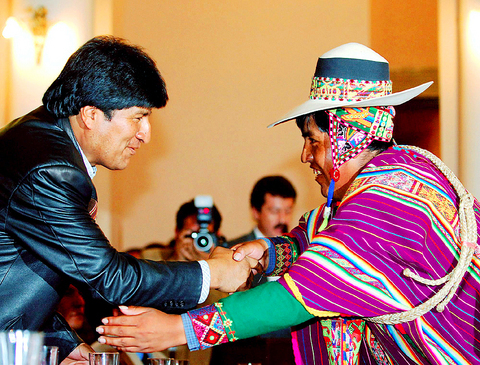Bolivian President Evo Morales signed into law a sweeping agrarian reform bill that distributes land to the poor but threatens to spark violence with government opponents.
Hundreds of indigenous Bolivians danced and cheered outside the presidential palace early yesterday celebrating the move.
Morales signed the law in a publicly ceremony just before midnight Tuesday, only minutes after it was passed by the Senate.

PHOTO: EPA
Large landowners in the eastern Agricultural regions of Santa Cruz, Beni and Pando strongly opposed the new law, which grants the government power to seize land deemed unproductive.
Eight civic groups representing powerful eastern Bolivian interests threatened a regional strike starting yesterday if pro-government measures, including land reform, were approved.
Supporters of Morales and the eastern regional groups have clashed violently in the past, most recently on Monday.
Speaking yesterday to supporters, Morales said the measure marked "the end of large estates" in Bolivia.
"Now we have the legal instrument to finish the large landowners in eastern Bolivia," he said.
The bill, which the chamber of deputies passed two weeks ago, was approved by a narrow quorum of 15 senators in the 27-member upper-house.
The conservative opposition, which holds 13 Senate seats, boycotted the vote. But in a surprise move substitute representatives of two opposition lawmakers showed up to vote for the measure, which outraged opposition leaders.
"They were bribed," said opposition senator Jose Villavicencio, offering no proof to his charges.
The two substitute senators, Andres Heredia and Hector Vargas, denied they had been bribed, and the head of the Senate, Santos Ramirez, praised their vote as "honest" and hailed the "historic consequences to the country and its majorities."
Earlier, thousands of indigenous protesters who had come from across the country chanted "Land, Damn it!" at a La Paz rally. Some had walked as far as 500km in marches launched several weeks ago from the Andean mountains and plains of Bolivia.
"We will not leave with empty hands," said Oscar Nunez, leader of the confederation of indigenous people of Bolivia. "We want title to property."
Morales faced fierce opposition, especially in eastern Bolivia, to the land reform bill as well as other plans to rewrite the Constitution and exert more authority over regional governors. Morales' opponents have launched their own protests and a series of hunger strikes, accusing the president of trampling democracy in his effort to push through a radical reform agenda.
The leader of the conservative opposition, former president Jorge Quiroga, said he too was ready for more talks with the leftist government to defuse the growing crisis.
But he said that the government must respect the law and uphold a requirement for a two-thirds majority to approve any changes to the constitution proposed by a Constituent Assembly.
The pro-government Movement Toward Socialism party pushed through a rule change that requires only a simple majority for revising the Constitution -- effectively shutting out the opposition.

The collapse of the Swiss Birch glacier serves as a chilling warning of the escalating dangers faced by communities worldwide living under the shadow of fragile ice, particularly in Asia, experts said. Footage of the collapse on Wednesday showed a huge cloud of ice and rubble hurtling down the mountainside into the hamlet of Blatten. Swiss Development Cooperation disaster risk reduction adviser Ali Neumann said that while the role of climate change in the case of Blatten “still needs to be investigated,” the wider impacts were clear on the cryosphere — the part of the world covered by frozen water. “Climate change and

Poland is set to hold a presidential runoff election today between two candidates offering starkly different visions for the country’s future. The winner would succeed Polish President Andrzej Duda, a conservative who is finishing his second and final term. The outcome would determine whether Poland embraces a nationalist populist trajectory or pivots more fully toward liberal, pro-European policies. An exit poll by Ipsos would be released when polls close today at 9pm local time, with a margin of error of plus or minus 2 percentage points. Final results are expected tomorrow. Whoever wins can be expected to either help or hinder the

DENIAL: Musk said that the ‘New York Times was lying their ass off,’ after it reported he used so much drugs that he developed bladder problems Elon Musk on Saturday denied a report that he used ketamine and other drugs extensively last year on the US presidential campaign trail. The New York Times on Friday reported that the billionaire adviser to US President Donald Trump used so much ketamine, a powerful anesthetic, that he developed bladder problems. The newspaper said the world’s richest person also took ecstasy and mushrooms, and traveled with a pill box last year, adding that it was not known whether Musk also took drugs while heading the so-called US Department of Government Efficiency (DOGE) after Trump took power in January. In a

It turns out that looming collision between our Milky Way and Andromeda galaxies might not happen after all. Astronomers on Monday said that the probability of the two spiral galaxies colliding is less than previously thought, with a 50-50 chance within the next 10 billion years. That is essentially a coin flip, but still better odds than previous estimates and farther out in time. “As it stands, proclamations of the impending demise of our galaxy seem greatly exaggerated,” the Finnish-led team wrote in a study appearing in Nature Astronomy. While good news for the Milky Way galaxy, the latest forecast might be moot